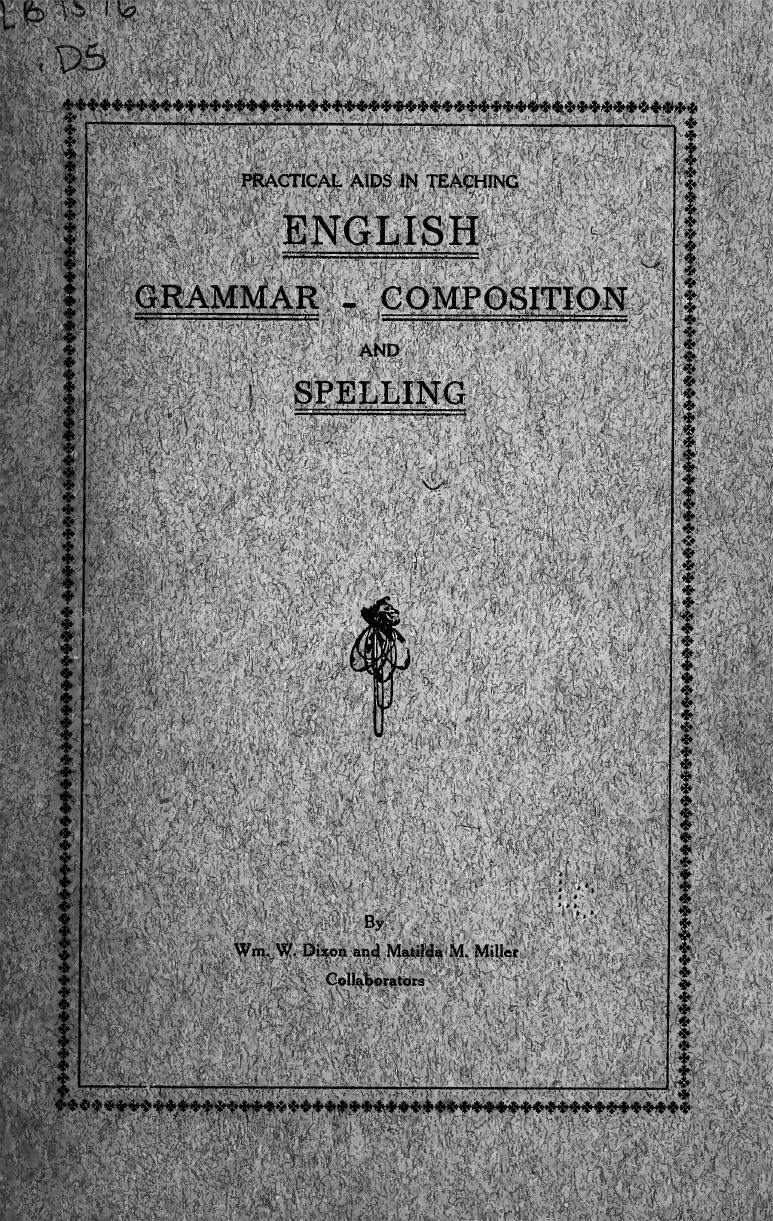Practical aids in teaching English grammar--composition and spelling by Dixon William W

Author:Dixon, William W. [from old catalog] & Miller, Matilda M., [from old catalog] joint author
Language: eng
Format: epub, pdf
Tags: English language
Publisher: [Eau Claire, Wis., Printed by Eau Claire press company]
Published: 1916-03-25T05:00:00+00:00
THE TEACHING OF GRAMMAR.
19
The two principles, "The second form of an irregular verb is used in the past tense only," and, "The third form of an irregular verb is used in all perfect tenses, and in all forms of the passive voice," are good guides in this drill work.
Buehler's "Practical Exercises in English" may be found to be very helpful on account of the amount of practice material that it contains.
If a pupil says, I seen it, or I have saw it, ask him to justify the form of the verb used in the light of the a.bove principles. By doing this a few times, he learns to choose with care the form of the verb used, thus forming a habit of correct speech with respect to tense forms.
Again, should the pupil say, "The water is all drank up", call his attention to the fact that the sentence is in the passive voice. He should know by this time the different forms of the verib "Be"—is, are, am, was, were; the three forms of the irregular verbs; and what a transitive verb is.
So, knowing these, it should 'be an easy matter for him to know when a verb is in the passive voice, that is, when some form of the verb Be is joined to the third form of a transitive verb. (Metcalf's English Grammar p. 153.) The cMld should learn the definition for the passive voice. He will see by the definition that the verti drink is a transitive verb, also that the verb Is, is one of the forms of the verb Be. The definition states that the third form of the verb should be used with some form of Be to form the passive voice; therefore, the sentence should read. The water Is all drunk up. It is because of the possibility of the error of using the second form instead of the third in the passive voice that the subject needs some careful attention on the part of both teacher and pupils. Generally, grammar grade pupils, and many times those of higher grades, do not know when a sentence is in a perfect tense. They need to be told that the auxiliaries have and has, when used in a sentence, put it in the present perfect tense, and that had is the sign of the past perfect tense.
By reference to the second rule given above, it will be seen that the third form of an irregular verb is used in all perfect tenses.
The science of grammar belongs rather to the higher than the lower grades. The sulsject and predicate should ^be taught in the fifth school
Download
Practical aids in teaching English grammar--composition and spelling by Dixon William W.pdf
This site does not store any files on its server. We only index and link to content provided by other sites. Please contact the content providers to delete copyright contents if any and email us, we'll remove relevant links or contents immediately.
The Art of Coaching Workbook by Elena Aguilar(49706)
Trainspotting by Irvine Welsh(20720)
Twilight of the Idols With the Antichrist and Ecce Homo by Friedrich Nietzsche(18113)
The Secret History by Donna Tartt(17778)
Cat's cradle by Kurt Vonnegut(14491)
All the Missing Girls by Megan Miranda(14009)
Ready Player One by Cline Ernest(13669)
Talking to Strangers by Malcolm Gladwell(12587)
Fangirl by Rainbow Rowell(8481)
Thirteen Reasons Why by Jay Asher(8249)
The Compound Effect by Darren Hardy(8219)
The remains of the day by Kazuo Ishiguro(8076)
Periodization Training for Sports by Tudor Bompa(7714)
Tools of Titans by Timothy Ferriss(7531)
Wonder by R. J. Palacio(7483)
The Lover by Duras Marguerite(7429)
Change Your Questions, Change Your Life by Marilee Adams(7137)
The Complete Stick Figure Physics Tutorials by Allen Sarah(6958)
A Court of Wings and Ruin by Sarah J. Maas(6832)
